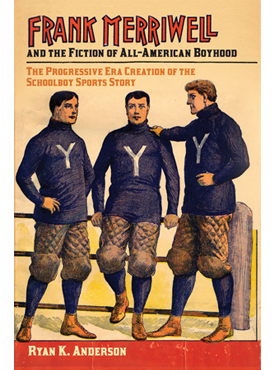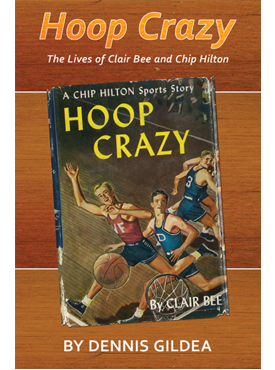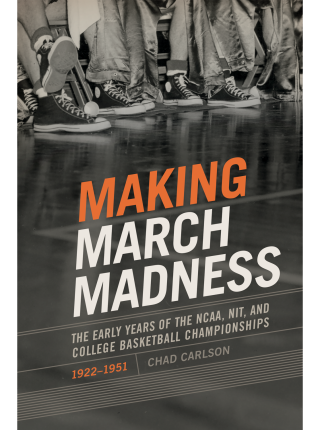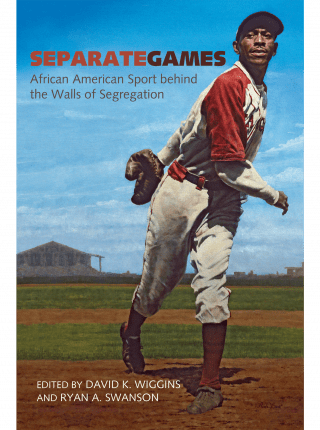Gilbert Patten, writing as Burt L. Standish, made a career of generating serialized twenty-thousand-word stories featuring his fictional creation Frank Merriwell, a student athlete at Yale University who inspired others to emulate his example of manly boyhood. Patten and his publisher, Street and Smith, initially had only a general idea about what would constitute Merriwell’s adventures and who would want to read about them when they introduced the hero in the dime novel Tip Top Weekly in 1896, but over the years what took shape was a story line that capitalized on middle-class fears about the insidious influence of modern life on the nation’s boys.
Merriwell came to symbolize the Progressive Era debate about how sport and school made boys into men. The saga featured the attractive Merriwell distinguishing between “good” and “bad” girls and focused on his squeaky-clean adventures in physical development and mentorship. By the serial’s conclusion, Merriwell had opened a school for “weak and wayward boys” that made him into a figure who taught readers how to approximate his example.
In Frank Merriwell and the Fiction of All-American Boyhood, Anderson treats Tip Top Weekly as a historical artifact, supplementing his reading of its text, illustrations, reader letters, and advertisements with his use of editorial correspondence, memoirs, trade journals, and legal documents. Anderson blends social and cultural history, with the history of business, gender, and sport, along with a general examination of childhood and youth in this fascinating study of how a fictional character was used to promote a homogeneous “normal” American boyhood rooted in an assumed pecking order of class, race, and gender.
Ryan K. Anderson is associate professor of history and the American studies coordinator at the University of North Carolina at Pembroke.
“Anderson has written an intelligent study of one of the more popular cultural heroes of the Progressive period. For countless readers, Frank Merriwell was a genuine hero to be revered and imitated. Anderson’s book shows us why.”
—Journal of Social History
“Anderson’s writing is swift and lucid. Moreover, his research is through and complemented by several illustrations that enhance his analysis. Readers interested in the Progressive Era, popular literature, publishing, gender studies, and sports will benefit from reading this book.”
—Journal of American History, March 2017
“No other character in American Sports Literature awakened such admiration as Frank Merriwell, whose impact on twentieth-century boyhood Anderson brings to light.”
—Journal of Sport History, Spring 2017
“A welcome addition to the literature on popular culture.”
—CHOICE, June 2016
“If ever a book deserved the adjective ‘definitive,’ this book does….In producing this book, Ryan K. Anderson has done the world of dime novel scholarship a service…. I highly recommend Frank Merriwell and the Fiction of All-American Boyhood.”
—Dime Novel Round-Up, Spring 2016
“Sheds new light on a crucial popular-culture phenomenon. Anderson’s book will be essential for readers interested in sport literature, cultural theory, and gender studies.”
—Tim Morris, author of Making the Team

Sport, Culture, and Society is a series from the University of Arkansas Press that publishes monographs and collections for academics and general readers in the humanities and social sciences. Its focus is the role of sport in the development of community and the forging of individual, local, regional, and national identities.
Sport is an extraordinarily important phenomenon that pervades the lives of many people and has enormous impact on society in an assortment of different ways. At its most fundamental level, sport has the power to bring people great joy and satisfy their competitive urges while at once allowing them to form bonds and a sense of community with others from diverse backgrounds and interests and various walks of life. Sport also makes clear, especially at the highest levels of competition, the lengths that people will go to achieve victory as well as how closely connected it is to business, education, politics, economics, religion, law, family, law, family, and other societal institutions. Sport is, moreover, partly about identity development and how individuals and groups, irrespective of race, gender, ethnicity or socioeconomic class, have sought to elevate their status and realize material success and social mobility.
Sport, Culture, and Society seeks to promote a greater understanding of the aforementioned issues and many others. Recognizing sport’s powerful influence and ability to change people’s lives in significant and important ways, the series focuses on topics ranging from urbanization and community development to biography and intercollegiate athletics. It includes both monographs and anthologies that are characterized by excellent scholarship, accessible to a wide audience, and interesting and thoughtful in design and interpretations. Singular features of the series are authors and editors representing a variety of disciplinary areas and who adopt different methodological approaches. The series also includes works by individuals at various stages of their careers, both sport studies scholars of outstanding talent just beginning to make their mark on the field and more experienced scholars of sport with established reputations.
The series is edited by David K. Wiggins.





